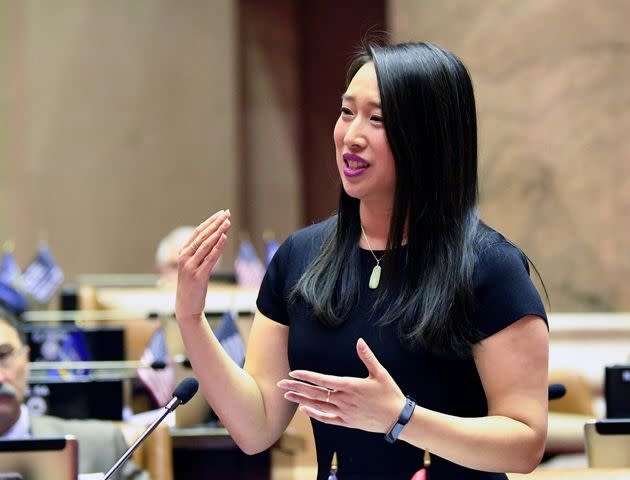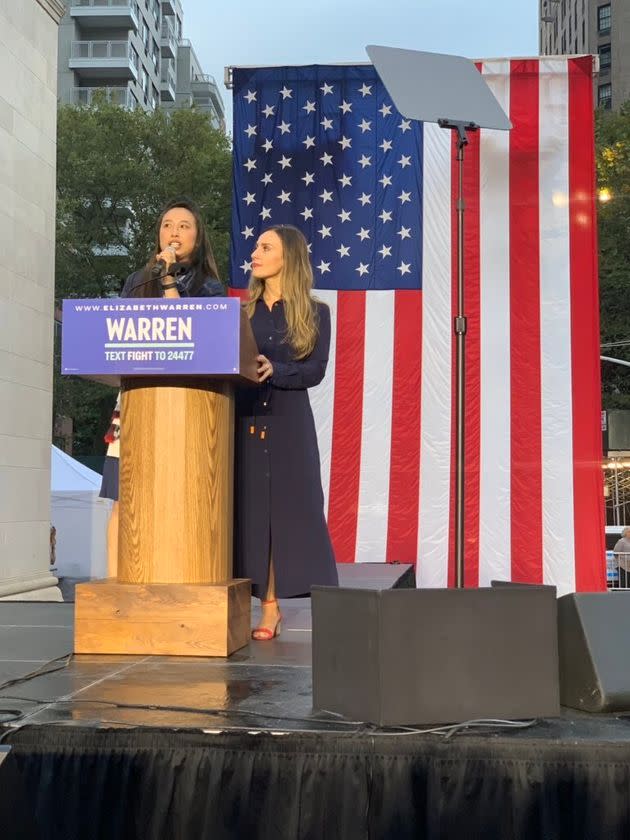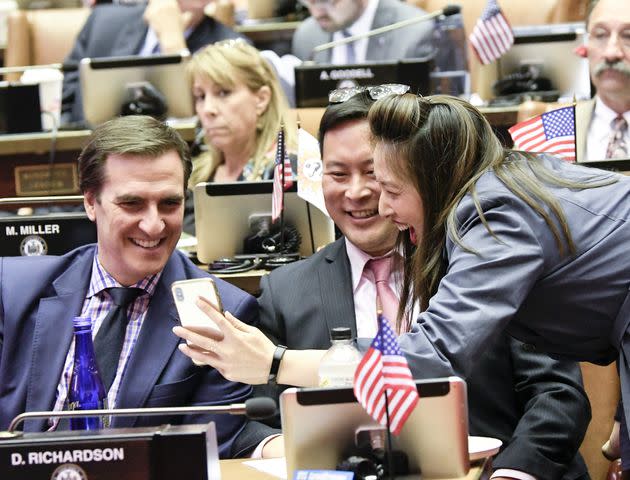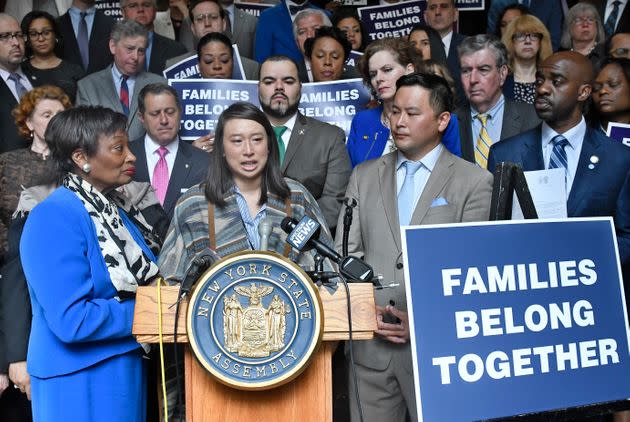Q&A With Yuh-Line Niou: NY-10 Democratic Congressional Candidate Isn’t Afraid To Fight For Progress
- Oops!Something went wrong.Please try again later.
- Oops!Something went wrong.Please try again later.
- Oops!Something went wrong.Please try again later.

New York Assemblywoman Yuh-Line Niou (D) would be the first openly autistic member of Congress and the second Asian American to represent New York in the nation's capital. (Photo: Hans Pennink/Associated Press)
NEW YORK — New York State Assemblywoman Yuh-Line Niou (D) is used to making powerful enemies — even in her own party. Niou won her state legislative seat by ousting an establishment incumbent in 2016, and has not hesitated to take on fellow Democrats when she felt they were betraying the party’s progressive ideals. She has had high-profile disputes with then-New York Gov. Andrew Cuomo (D) and then-New York City Mayor Bill de Blasio (D), and already had differences with their respectivesuccessors.
As a result of her outspokenness, the lower Manhattan lawmaker even elicited a self-funded centrist primary challenger in 2020, whom she easily defeated.
Niou ― whose full name is pronounced “You Lean New” ― is hoping to continue her winning streak in the Democratic primary for New York’s new 10th Congressional District on Aug. 23. The predominantly liberal seat encompasses lower Manhattan and a cluster of contiguous neighborhoods in central and South Brooklyn.
HuffPost is running an interview series with the 10th District candidates. Check out our previous interviews with Carlina Rivera and Bill de Blasio.
Niou, who immigrated to the United States from Taiwan as a child, would be the first openly autistic member of Congress and the second-ever Asian American to represent New York in Washington. She is also a former bartender, an enthusiastic karaoke participant, and an avid reader of science fiction-themed graphic novels.
Niou’s status as a progressive star has already helped her land endorsements from the New York Working Families Party, the New York City chapter of the climate action-focused Sunrise Movement, and democratic socialist state Sen. Julia Salazar (D).
But she is competing in a field of 13 Democrats that includes de Blasio, New York City Councilwoman Carlina Rivera, and Rep. Mondaire Jones (D), who had $2.9 million on hand at the end of March.
HuffPost interviewed Niou earlier this month over ice cream and dumplings in Manhattan’s Chinatown neighborhood. We asked her about her reasons for running, housing policy and the importance of Asian American representation.
The interview has been edited for clarity and length.

New York Assemblywoman Yuh-Line Niou (D), left, and state Sen. Alessandra Biaggi (D), a friend who is now also running for Congress, speak at a 2019 rally for the presidential campaign of Sen. Elizabeth Warren (D). (Photo: Eliza Orlins/Twitter)
Why run for this seat?
This is a once-in-a-generation opportunity to represent an open congressional seat in New York.
We’re trying to represent folks who have never been represented on the congressional level before. There’s a lack of representation on the federal level, in terms of diversity, in terms of lens, and in terms of perspective. We need to have a lot of different kinds of lenses so that we can have better policy. That’s how we make good policy.
I’m hoping that we can have this opportunity for all of our communities to have representation.
I’ve obviously served for six years in the Assembly. And I feel like it was something that was lacking on the Assembly level.
Now obviously, we need to fight more than ever on the congressional level. We’re seeing that we are losing not just our bodily autonomy, but also so much of our rights. We need to make sure that we have people who are courageous in this moment, to fight for us. My district, my community asked me to fight and so I’m fighting.
You seem like you would be a natural addition to the “Squad,” because you’re kind of a part of the state Capitol “Squad” in Albany. Do you aspire to be part of that ultra-progressive bloc of fighters?
I need to represent my people. My district is very, very progressive. There’s a lot of stances that we have to take to make sure that we have the voices of our constituents represented. I will say that over and over and over again.
But it’s not so simple as in, “Oh, this is going to be the viewpoint of this group, or that group.” And actually, every single person that you talk to will have different perspectives, and different lenses that they’re seeing things through.
You have to understand that there’s no wrong or right, or “this is the best way” or “this is the worst way.” It’s about trying to figure out what are some of the things that make those issues so important to people, and then figuring out how to best problem-solve.
Everybody’s perspective is important. Everybody’s perspective is valid. And that’s why it’s so fun to be able to understand where things are turning, so that we can have better answers.
One in four Asian Americans here in our city are living in poverty, and people don’t realize that.New York Assemblywoman Yuh-Line Niou (D)
Let’s take Chinatown as an example. What is an issue for which you think the neighborhood needs better advocacy on the federal level?
For example, language access is humongous, but people don’t ever think about it.
The federal government could do a lot on all of our forms, on its websites. I still remember seeing the signs for how to access help after 9/11 — none of it was translated, and our community was all affected up here. They didn’t know that they could go and get the victim compensation or they didn’t know that they could go and ask for medical help. It’s not out there.
It was really important for us to pass that language access bill providing translation for all state agency websites. On the state level, that was one of the biggest things that I worked on. Language access is very, very common sense stuff, but people don’t realize that because there’s no lens to see that it gets left on the table.
It helps everyone. When we are talking about every issue, we should be talking about it as a disability issue, because every issue is a disability issue, whether it’s housing, education — all of it. Everybody should have access, truly. If we’re building a ramp to make sure that we can get in to hard places, isn’t that easier for [people without disabilities too]?
One in four Asian Americans here in our city are living in poverty, and people don’t realize that. That makes it the most impoverished ethnic group in the entire city. It’s also just really, really sad because we also have the least amount of access to benefits. Not because they don’t already qualify. It’s because they don’t have language access. They don’t know how to apply. They don’t know how to get it.
What House committees would you like to be on if you have the chance?
I’ve always been an anti-poverty advocate. I worked a lot on stopping predatory lending. I actually helped to regulate the payday lending industry in Washington State when I was much younger. And then over here, obviously, we prohibit payday lending as a whole. But we also have seen that there are people who have tried to legalize payday lending through the back door with check cashing businesses. We tried to put together another legislative component into how they lend.
So I would probably want to be on committees that deal with financial services, banking and housing issues. I’m such a big proponent of public housing.

Niou chats with Assemblyman Ron Kim (D), center, and state Senate Deputy Majority Leader Michael Gianaris (D), left. She is part of a new crop of progressive New York lawmakers. (Photo: Hans Pennink/Associated Press)
Specifically on the issue of housing, what do you think the federal government can do better?
Fully funding our public housing and making sure that our public housing is not dilapidated. There were literally decades of disinvestment to our public housing and unfortunately that devastated our housing stock in a way that’s exponential. So if you’re not taking care of one thing, then every other thing will get worse and worse — lead paint, lack of hot water, lack of ability to take care of the mold remediation situation. We need around $70 billion just to fill the hole in public housing for our state.
What do you think of somebody coming in from the suburbs to run?
I like Mondaire [Jones] a lot. I fought for him in his election. I made calls for him with [the] Sunrise [Movement].
It’s a democracy. Anyone can run. But I do think that’s going to be up to the voters.
What about Bill de Blasio?
He’s a nice guy. I’ve met him a couple times. We have a couple of things that we disagree on — a lot of the things he tried to do in my community. My community is oversaturated — all communities of color are oversaturated — with shelters, jails, services that the whole city is benefiting from.
You also see the physical lack of investment when you’re walking around here. We had to walk almost five blocks [just now] to get to a trash can.
Is that why you opposed the Haven Green housing development, which claims to offer affordable housing?
I opposed it because they presented a plan that didn’t have any affordable housing — that was truly affordable, deeply affordable. The original plan also didn’t have a lot of longevity to the proposal — like very few years. So we had to push back.
And on top of that, if you’re taking away a public good, you should get a public good in return — a permanent public good in return. And this housing isn’t permanent. It’s 60 years and then it’s opened up to privatization. It’s really important that we actually have permanent affordability.
We already have a lack of green space down here. People have a hard time. People said, “Oh, my God! Where are the kids going to play?” Yes, we are a concrete jungle and we don’t hate density. We have density. It’s all about making sure that we are actually balancing all of the needs of our constituents, the people who are living down here.
I will say that the plans have gotten better due to the fact that we pushed back. I think that it could still get better. If the city really wanted it to be affordable, they could say that it will remain affordable for 99 years and that indicates an intention to make it permanent.
The U.S. does have certain amounts of power that it should exercise when there are bad things that are happening across the world.Assemblywoman Yuh-Lin Niou (D)
Would you have voted for the latest city budget — or joined the six progressive council members who voted against it?
I absolutely would have voted against it.
The federal budget gave us more education funding due to COVID. The state finally fulfilled its funding obligations. That’s billions of dollars. And I don’t understand why the city then cut education. I don’t understand it.
I have voted “no” on budgets before. But I’m not voting “no” lightly. I do it because sometimes we need to take a stand to make things better.
You’ve spoken out a lot about acts of violence against members of the Asian American and Pacific Islander community. Why has there been an increase in anti-Asian violence? What do you think can be done to reverse it?
On the federal level, our leaders were totally OK with demonizing Asian Americans, blaming the pandemic on us, using stereotypes that have been regurgitated over and over and over again after decades to harm us. It’s easy to use those things because Asian Americans have historically been demonized. That’s the kind of stuff that Trump was doing and a lot of our Congress members were saying.
That’s why it’s so important that we have people who are speaking out against it, and fighting against it.
There is a pretty diverse array of views within the Asian American community about law enforcement. What is your attitude about it? Is there a law enforcement component to addressing this issue?
Again, it’s about representation. We only have two high-ranking officers of Asian descent in the entire NYPD. And one of them, Thomas Chan, retired.
How are we serving our community? Are they actually policing in a way that’s helpful or harmful?
There’s a lack of representation there and until there’s a system that’s going to help us to be able to have things in perspective, then it’s not one that’s servicing our community.

Assemblywoman Yuh-Line Niou, center, speaks at a gathering of New York state lawmakers rallying against then-President Donald Trump's immigration policies in 2018. (Photo: Hans Pennink/Associated Press)
What do you make of conservatives’ argument that the 2019 bail reform legislation has contributed to an uptick in violent crime?
There is a purposeful story that they want to make about bail reform, which isn’t true. Bail reform is about making sure that there’s not two criminal justice systems — one for the rich, and one for the poor. It doesn’t mean that they’re not then still having to go to court and still could get charged or any of those things. It just means the difference between sitting on Rikers Island waiting for trial versus staying home and waiting for trial.
One thing you hear sometimes is that maybe judges should have more tools to deny people bail, such as determining whether someone is “dangerous.”
The word “dangerous” in a bail determination context has racist roots. “Dangerousness” and the determination of “dangerousness” is racist, because sometimes a judge will see something that is a subjective feeling of, “This is more dangerous.” That’s why it’s not legal language.
Judges have judicial discretion, just as they always have. People should probably think about what it is that judges are doing, not the law itself being the issue.
Do you think that there’s any room for common ground with Republicans in Congress?
We could probably come to some common ground when it comes to consumer protection issues, even some banking or labor practices.
But I think that that’s probably not going to be the same perspective when it comes to abortion rights, or health care. There’s a very distinct difference in what we think is important.
When we were talking about the Adult Survivors Act [enabling more adults to pursue justice for sexual abuse endured as children], we saw a lot of pushback from Republicans. They said we were trying to bankrupt the church. I had to step up and say, “None of this is about bankrupting churches or institutions. It’s about protecting kids.” My sharing my own experience of abuse made it so that a lot of people ended up voting for it that wouldn’t have otherwise.
One thing that you’ll get a chance to work on in Congress that you did not deal with in Albany is foreign policy. The United States recently gave $40 billion in aid to Ukraine and the only people to vote against it were Republicans. But some people on the left are concerned about more military spending, and escalated American involvement in conflicts. What are your thoughts?
I am never somebody who says, “We should be going to war.” But I do think that the U.S. does have certain amounts of power that it should exercise when there are bad things that are happening across the world.
Our government does have to make these hard decisions a lot. And I think that there’s probably information that I myself don’t know in how people made certain decisions. It’s really important to have that information for making those decisions.
Does that mean you’re not sure whether you’d support the aid package without more information?
An illegal invasion of another country by a global superpower, in which there are civilians killed, innocent people — there should be something for the world to say about that. But it’s really important that we see the effects and understand the effects that we have whenever we interfere with something abroad or insert our power. It should always be for humanitarian reasons and not just for ourselves.
This article originally appeared on HuffPost and has been updated.

